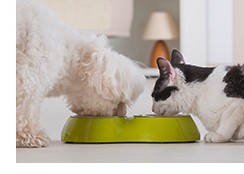
With so many brands and so many different types of food out there it is easy to become mind-boggled with the choice! Many pet owners keep their pet on the same food for the rest of their life, simply because they don’t understand all the options out there. When it comes to pet food, however, change can be hugely beneficial for your fur friend.
LIFE-STAGE PET FOOD
Generally, there are three stages in a pet’s life when it comes to choosing food for them, and these are puppy/kitten, adult and senior/mature. Food for puppies and kittens are specifically designed to aide growth and development and are typically higher in calorie count and protein levels. Adult or adult maintenance diets are designed to maintain healthy weight and nutrient levels as stipulated by pet food health regulations. Finally, senior pets have a higher chance of medical issues and will often benefit from a specifically formulated diet that can manage and/or discourage development of problems such as arthritis, heart, kidney and liver disease, diabetes and so on. Senior diets are typically high in glucosamine and/or fatty acids such as DHA and EPA, as well as fiber.
REASONS TO CHANGE YOUR PET FOOD
Changing pet food is best done via your Veterinarian as life-stage and lifestyle factors will be different for each pet. Seek advice if you notice any of the following signs:
OBESITY
Obesity is one of the largest problems affecting our pets and can lead to various medical problems in later life, including a reduced lifespan. Like humans, chances of diabetes and heart disease are significantly increased if there are extra kilos on that frame. Weight control diets are designed to be light in calories while still offering a healthy balance of nutrients and minerals.
ITCHES
Itchy skin is the main symptom of food allergies and if diagnosed a pet will benefit from a low-allergen diet. Seek recommendations from your Vet on which diet would be suitable.
DULL, FLAKY COAT
Noticed that your pet doesn’t shine as much as they used to, or they have a case of dandruff? Essential fatty acids are key when keeping the coat sleek and the skin balanced. Look out for diets containing Omega-3 and Omega-6.
LOW STAMINA
Weakness and lethargy should immediately be addressed by your Veterinarian, and if a symptom of the wrong food would benefit from a change to a pet food with high antioxidant levels to boost recovery and immunity.
GASTROINTESTINAL PROBLEMS
Tummy problems are a big sign of food intolerance or low-quality foods. Flatulence, diarrhea, constipation or rumbly tummies may mean your pet is getting the wrong diet. Switching to a higher grade of food or one for sensitive stomachs may be what is required to get your pet feeling tip-top again!
Choosing the right food for your pet can mean all the difference in the world to your fur friend’s quality of life. If you are concerned about whether yours is getting the best diet contact Pet Doctors to make an appointment today, or call us on 5576 0400.

